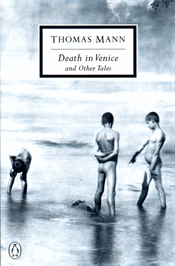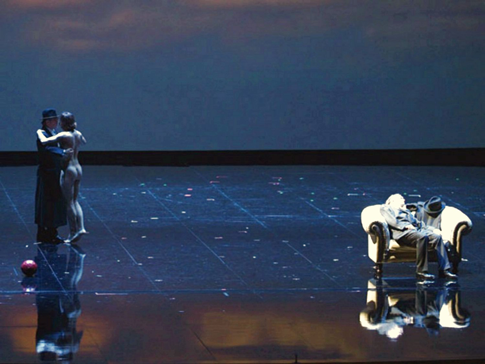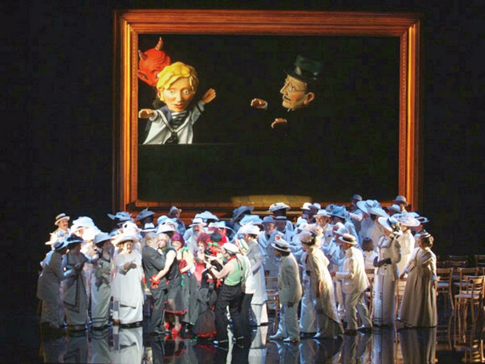
15 Jun 2008
See Venice and then die
For the belated Spanish premiere of Britten’s Death in Venice, 35 years after its creation in Aldeburgh, Barcelona seems a felicitous choice.
On the barren stage: a few chairs, a dark-gold hectoplasm projected on the wood panels of the acoustic chamber - nothing more.
For Bellini’s “I Capuletti e i Montecchi,” Paris Opera peopled its revival with plenty of star power.
When the Ringling Brothers folded their tents, opera took over. Aïda with elephants, and Walküre with real horses.
It is a bit hard to know what to make of Olivier Messiaen’s colossal piece “Saint François d’Assise,” beautifully mounted by Netherlands Opera.
If you are going to produce Jacques Fromental Halevy’s forgotten opera “Clari,” I urge you to first make sure you have a signature on the contact from a superstar with the firepower of Cecilia Bartoli.
It is worth remembering that prior to the première of Strauss’s opera in 1911, the working title was ‘Ochs auf Lerchenau’.
Opera producers in quest of headlines, unable to make them from the limited number of Mozart operas available (all of them far too familiar) but equipped with the flood of attractive young singers trained to sing Mozart in conservatories (because singing Mozart does not harm young voices, and singing Verdi and Wagner before 30 — better yet, 40 — often will), sometimes turn to Mozart’s contemporary, Cimarosa, and his Il Matrimonio Segreto, to get attention.
Handel’s Rodrigo, subtitled ‘Vincer se stesso è la maggior vittoria’ (Self-conquest is the greater victory) is one of the composer’s earliest operatic works, and rarely heard.
Chicago Opera Theater scored a resounding success with its area premiere of John Adams’ newest stage piece, “A Flowering Tree.”
Upon its premiere at Chicago’s Lyric Opera in 1997 Anthony Davis’ Amistad found little critical favor. Its undisciplined excesses led one writer to compare it to a high-school pageant.
In these days of 'concept' productions, it is rare that the curtain goes up on the first act of an opera and it looks exactly as one might reasonably expect it to.
I can still remember my first ever “Pelleas et Melisande” in my first ever outing at San Francisco Opera during my first ever visit to that beautiful town.
A recent visit to Berlin’s three opera houses yielded decidedly, nay wildly varying outcomes.
The Gotham Chamber Opera has been delighting opera fans on the Lower East Side for seven years now, one small audience at a time.
Thirty-six years after Sarah Caldwell and the Opera Company of Boston presented the first complete staged performances in the United States, Hector Berlioz’ Les Troyens returned to Boston in triumph in a series of concert performances presented by the Boston Symphony Orchestra under the baton of James Levine to close the BSO’s 2007-2008 season.
Opera companies should practice historic preservation, keeping certain productions forever in the repertory because of their quality and aesthetic value.
Prometeo is so radically different that it’s almost incomprehensible heard from preconceived assumptions of what music “ought” to be.
John Brown might have been a’mouldering in his grave since he was hanged in 1859, but he was resurrected — in body and spirit — on May 3, when the Lyric Opera of Kansas City staged the world premiere of Kirke Mechem’s John Brown.
When Toronto’s Opera Atelier asked her to sing Elettra in Mozart’s Idomeneo Measha Brueggergosman hesitated.
At the curtain call for the first night of WNO’s new production of the infrequently performed Khovanshchina director David Pountney wore a simple Russian shirt.

For the belated Spanish premiere of Britten’s Death in Venice, 35 years after its creation in Aldeburgh, Barcelona seems a felicitous choice.
The 17 scenes in this opera, succeeding at a very tense pace, profited by the Liceu’s sophisticated machinery and lighting equipments to turn the whole into a motion picture, if one unrelated to Luchino Visconti’s award-winning masterpiece Morte a Venezia. Incidentally, the opera and the film share both the same year of first release (1973) and the ominous fame of swan songs of their respective creators, neither of these having survived 1976. At that time, the openly homoerotic charge of Thomas Mann’s original novel (1913) still worked as a stumbling block for mainstream opera-goers, but nowadays the coming-out of respectable old professor von Aschenbach is probably perceived as no big news and definitely not worth such a tragic punishment as death by cholera or, arguably, a “passive” suicide.
Guilt and punishment are such stuff as tragedy is made of. Since the shift in current morals caused feeling of guilt to disappear from the Western public discourse on homosexuality (even less so in Spain, where gay couples are legally allowed to marry), tragicism is no longer an option for staging Death in Venice. Thus director Willy Decker felt bound to pepper the story a bit by adding such hypes as Aschenbach kissing the boy Tadzio on a megascreen or desperately waltzing with him around the stage. True, all that happens as if in a dream, but when the agonizing scholar gets overwhelmed by a heap of naked male bodies choking him to death, one cannot help wondering how counter-heroically all that display of flesh can work, irrespective of the viewer’s sexual leanings. Let’s stop it here, lest both the director and this reviewer be exposed as homophobics in disguise…
The tribute to postmodern commonsense having been paid, Decker felt free to follow the libretto as literally as librettist Myfanwy Piper had done with Mann’s novel. His Venice is a disquieting city peopled by ruffians, gondoliers, porters, whores and peddlers of dubious goods and services, their faces and clothes painted with garish clown-like colors. The hollow cosmopolitan socialites assembling in the Grand Hôtel des Bains at the Lido are their victims, yet Aschenbach cannot sympathize with them either. All he is after is ideal beauty, whether in a Caravaggio painting on display at a museum or in Tadzio’s angelic face. In the end, both images morph in front of his eyes into one nightmarish obsession, while the Gods of Greece — Apollo and Bacchus — fight over his soul with contrasting messages from heaven, as in a mystery play. The sets are gorgeous, with blue skies recalling Magritte and pitch-black waters in realistic movie projections.
 left: Uli Kirsch (Tadzio) [with Aschenbach’s Dopplegänger], right: Hans Schöpflin (Aschenbach)
left: Uli Kirsch (Tadzio) [with Aschenbach’s Dopplegänger], right: Hans Schöpflin (Aschenbach)
The same struggle between life and death breathed from the orchestral pit, mirroring the shifts of wind and tide from the iodine scent of the open sea to the heavy stench of the Lagoon in Summer and back — a common experience for Venice visitors, cleverly described in the libretto. Under Sebastian Weigle’s baton, the taxing score emerged in a glory of harmonies and colors: full-tone scales alternating with polytonalism, piano with Java-style gamelan and far-away echoes of the Baroque. Also the singing company was top-level. The German tenor Hans Schöpflin spun his exquisite mezza voce over the stream of inner monologues and extatic flourishes devised by Britten for his aging mate Peter Pears. Aschenbach’s protean opponent, tempter, flatterer, was the Texan baritone Scott Hendrick, always magnetic throughout his seven so diverse roles. Countertenor Carlos Mena, a reputed Baroque specialist, lent his sunny and mellow alto range to Apollo’s oracles. Within the swarm of cameo roles, particular praise was deserved by the sanguine Begoña Alberdi in the double bill of Strawberry Seller / Newspaper Seller, and by Leigh Melrose, a New Yorker, whose extended narrative solo as The English Clerk in the travel bureau (“In these last years/ The Asiatic cholera has spread/ from the Delta of the Ganges”) conveyed a thrill of Doomsday.
Carlo Vitali
 Death in Venice, Act 2, sc. 10 (The strolling players)
Death in Venice, Act 2, sc. 10 (The strolling players)